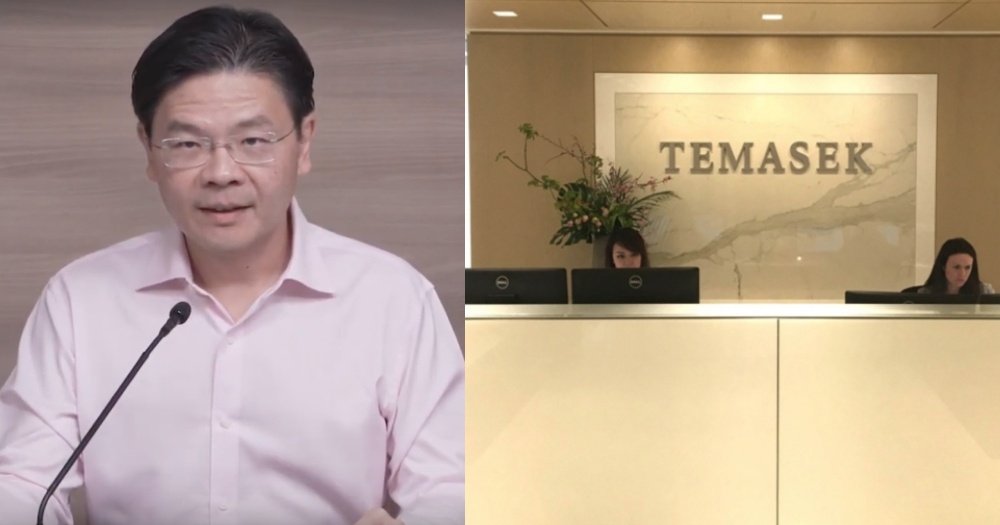The government "maintains an arm's-length relationship" with both GIC and Temasek, Second Minister for Finance and Minister for National Development Lawrence Wong said at the Ministry of Finance (MOF)'s Committee of Supply (COS) debate on Friday, Feb. 28.
Wong explained that the mandate the government places on these two commercially-run entities is to "generate long-term financial returns for the benefit of Singaporeans and the two agencies".
He said that as part of the government's key consideration, whatever disclosure requirements the two entities put out should be part of "an overall system" that allows them to "maximise their ability to secure long-term returns for the benefit of Singaporeans".
Perera: Lack of disclosure of remuneration & succession matters "problematic"
The minister was replying to Non-Constituency MP Leon Perera, who asked how Singaporeans could obtain "a reasonable degree of accountability and transparency over matters relating to business succession and top executive compensation" at the sovereign wealth funds.
This is especially so, since they manage "hundreds of billions of dollars of public funds".
Perera had also said the lack of disclosure was "problematic" as the two entities are not privately-held commercial entities, but are "public ones, managing public funds".
He quoted Singapore Exchange Regulation chief executive Tan Boon Gin as well, who said the board and management owe it to investors to "explain the link between performance and remuneration" as shareholders, especially minorities, deserve to know "why company directors and executives are paid the way they are".
On the issue of leadership succession, Perera said the public has "a legitimate interest" in understanding why CEO succession was deemed important enough in 2009 for a CEO designate to be appointed, yet there has "not been any concrete movement on succession in the 11 years since then".
Asked about leadership succession in 2017 too
Perera had raised the same question about the CEO succession process at Temasek in 2017 as well.
Then Senior Minister of State for Finance Indranee Rajah, now Second Finance Minister, had given a similar reply to Wong's, saying that succession planning for the firm's leadership is decided by the board, not the government, CNA reported.
Boards are "ultimately responsible" for their performances
In response, Wong said the government has already explained its position clearly on these issues.
He said that the boards of these entities are "ultimately responsible" for their respective operations, performances, as well as succession for leadership.
Wong, who sits on the GIC's board of directors, had made the same point previously in May 2019 in response to Hougang SMC MP Png Eng Huat's question on the range of annual remuneration for the key management of the entities.
According to Today, Wong declined to disclose the numbers at that time, and said the government keeps an "arm's-length relationship" with both GIC and Temasek, and does not interfere with the firms' operational decisions.
He added that the boards are accountable to the government for the performances of their top management.
Puts out a lot of information in annual reports
In his latest reply to Perera, Wong noted that both entities put out "a lot of information every year" in their annual reports that highlight not just their performance, but also "extensive information and commentary on their investment approach and their outlook".
He added, "In fact, over the years, you will have seen that GIC and Temasek have progressively put out a lot more information in their annual reports than they used to.
He said the government will continue to encourage them to "review and examine what additional information they would like to put out in their annual reports".
GIC & Temasek look at long-term financial returns
The minister added that the government has to be "very mindful" of the kind of disclosure" they placed on the two entities, and be careful to not lead them to "pursue indicators that can lead to wrong behaviours or undesirable behaviours".
He cited an example, saying that if the government insist on them publishing annual indicators of performance, as some have suggested before, these entities may then be "driven towards short-term performance" that will not be in the government's interest.
"If we are insistent on them disclosing indicators of fees and expenses to a very great level of detail, it may lead these entities towards minimising expenses," he said.
And this "potentially eroding capabilities" are diminishing the talent pool which will also not be in the government's interest, he added.
Government is "careful and deliberate" when it comes to the system they want
Wong ended his response by saying that the government is "quite careful and deliberate" in thinking about the sort of system they want to put in place.
He reiterated that what they want ultimately is "a system that should enhance the performance of the two entities in securing long-term returns".
And that is why the two entities publish the "long-term returns net of all expenses incurred", he said.
Coming back to his earlier point about the purpose of the two entities, he said that the government ultimately wants both GIC and Temasek to "preserve the competitive advantage", and for them to "maximise their ability to secure long-term returns for the benefit of Singaporeans".
Top image via gov.sg/YouTube & Temasek website
If you like what you read, follow us on Facebook, Instagram, Twitter and Telegram to get the latest updates.
